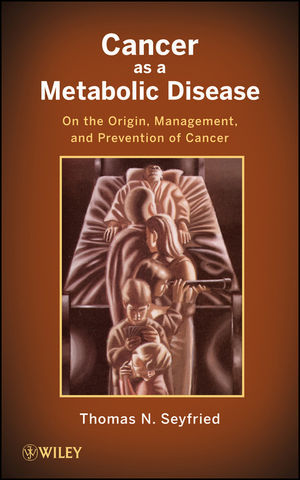상품상세정보
The book addresses controversies related to the origins of cancer and provides solutions to cancer management and prevention. It expands upon Otto Warburg's well-known theory that all cancer is a disease of energy metabolism. However, Warburg did not link his theory to the "hallmarks of cancer" and thus his theory was discredited. This book aims to provide evidence, through case studies, that cancer is primarily a metabolic disease requring metabolic solutions for its management and prevention. Support for this position is derived from critical assessment of current cancer theories. Brain cancer case studies are presented as a proof of principle for metabolic solutions to disease management, but similarities are drawn to other types of cancer, including breast and colon, due to the same cellular mutations that they demonstrate
- Contents -
1. Images of Cancer 1
How Cancer is Viewed 2
References 13
2. Confusion Surrounds the Origin of Cancer 15
The Oncogenic Paradox 18
Hallmarks of Cancer 18
Reassessment 26
References 27
3. Cancer Models 31
Problems with Some Cancer Models 31
Animal Charges as a Major Impediment to Cancer Research 38
Problems with Tumor Histological Classification 39
Personal Perspective on Cancer 44
References 45
4. Energetics of Normal Cells and Cancer Cells 47
Metabolic Homeostasis 47
The Constancy of the �G� ATP 54
ATP Production in Normal Cells and Tumor Cells 55
Energy Production Through Glucose Fermentation 57
Glutaminolysis with or without Lactate Production 61
Transamination Reactions 64
TCA Cycle, Substrate-Level Phosphorylation 66
Cholesterol Synthesis and Hypoxia 67
Summary 67
References 68
5. Respiratory Dysfunction in Cancer Cells 73
Normal Mitochondria 74
Morphological Defects in Tumor Cell Mitochondria 77
Proteomic Abnormalities in Tumor Cell Mitochondria 79
Lipidomic Abnormalities in Tumor Cell Mitochondria 81
Cardiolipin: A Mitochondrial-Specific Lipid 83
Cardiolipin and Abnormal Energy Metabolism in Tumor Cells 85
Complicating Influence of the In Vitro Growth Environment on Cardiolipin Composition and Energy Metabolism 92
Mitochondrial Uncoupling and Cancer 97
Cancer Cell Heat Production and Uncoupled Mitochondria 98
Personal Perspective 99
Summary 100
References 101
6. The Warburg Dispute 107
Sidney Weinhouse’s Criticisms of the Warburg Theory 108
Alan Aisenberg’s Criticisms of the Warburg Theory 110
Sidney Colowick’s Assessment of the Aisenberg Monograph 113
Apples and Oranges 114
References 116
7. Is Respiration Normal in Cancer Cells? 119
Pseudo-Respiration 119
How Strong is the Scientific Evidence Showing that Tumor Cells can Produce Energy Through OxPhos? 124
OxPhos Origin of ATP in Cancer Cells Reevaluated 124
What About OxPhos Expression in Other Tumors? 127
The Pedersen Review on Tumor Mitochondria and the Bioenergetics of Cancer Cells 128
References 129
8. Is Mitochondrial Glutamine Fermentation a Missing Link in the Metabolic Theory of Cancer? 133
Amino Acid Fermentation can Maintain Cellular Energy Homeostasis During Anoxia 133
Evidence Suggesting that Metastatic Mouse Cells Derive Energy from Glutamine Fermentation 134
Fermentation Energy Pathways can Drive Cancer Cell Viability Under Hypoxia 138
Competing Explanations for the Metabolic Origin of Cancer 141
Chapter Summary 143
References 143
9. Genes, Respiration, Viruses, and Cancer 145
Does Cancer have a Genetic Origin? 145
Respiratory Insufficiency as the Origin of Cancer 150
Germline Mutations, Damaged Respiration, and Cancer 154
Somatic Mutations and Cancer 158
Revisiting the Oncogene Theory 160
Mitochondrial Mutations and the Absence or Presence of Cancer 163
Viral Infection, Damaged Respiration, and the Origin of Cancer 165
Summary 168
References 168
10. Respiratory Insufficiency, the Retrograde Response, and the Origin of Cancer 177
The Retrograde (RTG) Response: An Epigenetic System Responsible for Nuclear Genomic Stability 177
Inflammation Injures Cellular Respiration 181
Hypoxia-Inducible Factor (HIF) Stability is Required for the Origin of Cancer 182
Mitochondria and the Mutator Phenotype 183
Calcium Homeostasis, Aneuploidy, and Mitochondrial Dysfunction 186
Mitochondrial Dysfunction and Loss of Heterozygosity (LOH) 187
Tissue Inflammation, Damaged Respiration, and Cancer 188
References 189
11. Mitochondria: The Ultimate Tumor Suppressor 195
Mitochondrial Suppression of Tumorigenicity 195
Normal Mitochondria Suppress Tumorigenesis in Cybrids 196
Evidence from rho0 Cells 198
Normal Mitochondria Suppress Tumorigenesis In Vivo 199
Normal Mouse Cytoplasm Suppresses Tumorigenic Phenotypes 200
Enhanced Differentiation and Suppressed Tumorigenicity in the Liver Microenvironment 202
Summary of Nuclear-Cytoplasmic Transfer Experiments 203
References 204
12. Abnormalities in Growth Control, Telomerase Activity, Apoptosis, and Angiogenesis Linked to Mitochondrial Dysfunction 207
Growth Signaling Abnormalities and Limitless Replicative Potential 208
Linking Telomerase Activity to Cellular Energy and Cancer 209
Evasion of Programmed Cell Death (Apoptosis) 209
Sustained Vascularity (Angiogenesis) 210
References 211
13. Metastasis 215
Metastasis Overview 215
Cellular Origin of Metastasis 217
Macrophages and Metastasis 221
Carcinoma of Unknown Primary Origin 232
Many Metastatic Cancers Express Multiple Macrophage Properties 233
Linking Metastasis to Mitochondrial Dysfunction 233
Revisiting the “Seed and Soil” Hypothesis of Metastasis 235
Revisiting the Mesenchymal Epithelial Transition (MET) 236
Genetic Heterogeneity in Cancer Metastases 237
Transmissible Metastatic Cancers 240
The Absence of Metastases in Crown-Gall Plant Tumors 240
Chapter Summary 241
References 241
14. Mitochondrial Respiratory Dysfunction and the Extrachromosomal Origin of Cancer 253
Connecting the Links 254
Addressing the Oncogenic Paradox 255
Is Cancer Many Diseases or a Singular Disease of Energy Metabolism? 258
References 258
15. Nothing in Cancer Biology Makes Sense Except in the Light of Evolution 261
Revisiting Growth Advantage of Tumor Cells, Mutations, and Evolution 262
Tumor Cell Fitness in Light of the Evolutionary Theory of Rick Potts 269
Cancer Development and Lamarckian Inheritance 271
Can Teleology Explain Cancer? 272
References 272
16. Cancer Treatment Strategies 277
Current Status of Cancer Treatment 277
The “Standard of Care” for Glioblastoma Management 280
References 285
17. Metabolic Management of Cancer 291
Is it Dietary Content or Dietary Composition that Primarily Reduces Tumor Growth? 292
Dietary Energy Reduction and Therapeutic Fasting in Rodents and Humans 294
Ketogenic Diets 295
Glucagon and Insulin 297
Basal Metabolic Rate 298
Ketones and Glucose 298
Metabolic Management of Brain Cancer Using the KD 299
Glucose Accelerates Tumor Growth! 301
Glucose Regulates Blood Levels of Insulin and Insulin-Like Growth Factor 1 302
Dietary Energy Reduction is Antiangiogenic 302
Dietary Energy Reduction Targets Abnormal Tumor Vessels 307
Dietary Energy Reduction is Proapoptotic 309
Dietary Energy Reduction is Anti-Inflammatory 310
Targeting Energy Metabolism in Advanced Cancer 314
Differential Response of Normal Cells and Tumor Cells to Energy Stress 316
Dietary Energy Reduction is Anti-Invasive in Experimental Glioblastoma 318
Influence of Growth Site and Host on Tumor Progression 322
Implications of Dietary Energy Reduction for Anticancer Therapeutics 324
Targeting Glucose 325
Metformin 326
Synergistic Interaction of the Restricted Ketogenic Diet (KD-R) and 2-Deoxyglucose (2-DG) 327
Can Synergy Occur with the KD-R and Hyperbaric Oxygen Therapy? 331
Targeting Glutamine 333
Glutamine Targeting Inhibits Systemic Metastasis 334
Targeting Phagocytosis 339
Targeting the Microenvironment 340
Dietary Energy Reduction as a Mitochondrial Enhancement Therapy (MET) 341
Summary 341
References 341
18. Patient Implementation of Metabolic Therapies for Cancer Management 355
Introduction 355
Guidelines for Implementing the Restricted Ketogenic Diet as a Treatment Strategy for Cancer 356
Complicating Issues for Implementing the KD-R as a Treatment Strategy for Cancer 366
Radiation and Chemotherapy is a Standard Treatment for Many Malignant Cancers 366
Compliance 367
Cancer as a Genetic Disease 367
Mechanism of Action? 368
Cachexia 368
Summary 369
References 370
19. Cancer Prevention 375
Cell Phones and Cancer 376
Alzheimer’s Disease and Cancer Risk 377
Ketone Metabolism Reduces Cancer Risk 378
Mitochondrial Enhancement Therapy 379
Therapeutic Fasting and Cancer Prevention 379
Autophagy and Autolytic Cannibalism: A Thermodynamic Approach to Cancer Prevention 381
Cancer Prevention by Following Restricted Ketogenic Diet 382
References 384
20. Case Studies and Personal Experiences in Using the Ketogenic Diet for Cancer Management 387
Effects of a Ketogenic Diet on Tumor Metabolism and Nutritional Status in Pediatric Oncology Patients: Comments from Dr. Linda Nebeling 387
Raffi’s Story: Comments from Miriam Kalamian 389
Biological Plausibility that Cancer is a Metabolic Disease Dependent for Growth on Glucose and Glutamine: Comments from Dr. Bomar Herrin 395
Using the Restricted Ketogenic Diet for Brain Cancer Management: Comments from Neuro-Oncologist, Dr. Kraig Moore 397
The Ketogenic Diet for Brain Cancer Management: Comments from Beth Zupec-Kania 400
Summary 402
References 403
21. Conclusions 405
Major Conclusions 407
References 408
Index 409
[성보의학서적]





























